Chanukah at Los Angeles Jewish Health Shined Brighter Than Ever This Year


Chanukah at Los Angeles Jewish Health Shined Brighter Than Ever This Year
By Rabbi Karen Bender, Chief Mission Officer at Los Angeles Jewish Health
When I arrived at Los Angeles Jewish Health almost a decade ago and Chanukah was soon approaching, I set out to purchase the largest Chanukah menorah that I could find. I decided this holiday should feel like an extravaganza. There would be joy, surprise, celebration, laughter, and of course, the spectacular and inspiring lights of the largest Chanukah menorah around. Our residents deserved the best.
This year, with the struggles of our brethren in Israel, and even rising antisemitism here in the United States, would we do anything differently? Yes, we would rejoice with even more depth and joy and enthusiasm. After all, like Israel’s courageous soldiers who are fighting on the front lines of the Jewish People today, the Maccabees fought for our right to practice and celebrate Judaism. We honor the courage of both by being brave enough to rejoice. Indeed, our residents deserve it.
The first Prime Minister of Israel, David Ben Gurion, once said, “In Israel in order to be a realist, you must believe in miracles.” As our brothers and sisters in Israel still struggle to bring the light, we brought the miracle of joy and hope to our residents this past Chanukah like never before. After all, the primary theme of Chanukah is the unwavering faith in miracles, as the second blessing of the holiday says, “she-asah nisim l’avoteinu” thanking G-d for the miracles made for our ancestors at this season in those days.
Here at Los Angeles Jewish Health, we of course provide tradition with the intent of stimulating wonderful memories. It is our fervent belief, as well, that extraordinary memories can and are made here. Perhaps the most exciting Chanukah of a person’s life has not yet happened but will happen soon and will happen here.
This year our residents enjoyed a concert with a prominent and highly esteemed local musician, Cindy Paley and a Klezmer group performed traditional folk music. There was traditional singing throughout the holiday. In addition, groups of children from various organizations came to enhance the holiday for all of our residents. The residents also participated in an olive oil and balsamic tasting while learning about Chanukah on a serious adult level. They received new colorful dreidels and chocolate gelt coins. They enjoyed not only potato latkas but also latkas of various vegetable influences, thanks to our creative dietary department leadership. They enjoyed Chanukah cookies and not only regular sufganiyot but also kosher Krispy Kreme jelly donuts. They lit lights and sang blessings as a large community, grateful, each of them, to not be alone these eight nights but on the contrary, to be surrounded by a loving community of peers and caring staff.
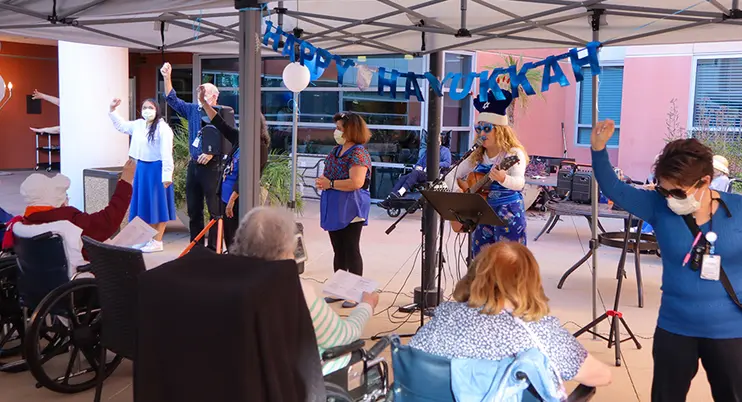
They laughed in delight when I showed up dressed as a dreidel one day, as a menorah another, wearing a head to toe Chanukah outfit the next and Chanukah glasses another.
Rabbi Ron Goldberg at the Eisenberg Village Campus describes how the eyes of the residents in our memory care unit lit up as they remembered the words of songs and sang along. He describes gathering everyone around the beautiful outdoor chanukiah, the Chanukah menorah, where together they could safely light real fire, like our ancestors.
Our ancestral rabbis were well aware that Chanukah takes place near the winter solstice during the darkest days of the year and they set out to pierce the darkness and illuminate their world. The metaphor was not lost on them nor is it on us, especially this year, that we can all be a light in the darkness. Nothing brings more light than the smiles on the faces of the precious seniors we serve.
Ben Gurion had another famous saying: “Anyone who believes you can’t change history has never tried to write his memoirs.” For all of you out there who choose to support the sacred work of Los Angeles Jewish Health with your time and resources, please know that you are changing history by enhancing the history and lives of our remarkable residents, participants and patients. Know that if you were to ever write a memoir about your own life you can proudly include the indisputable fact that you have generously enhanced the lives of the elderly in your generation.
For more pictures of Chanukah 2023 at Los Angeles Jewish Health CLICK HERE
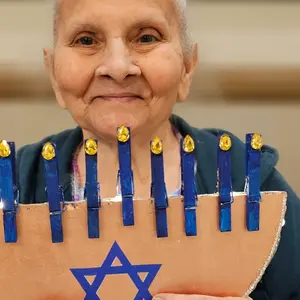

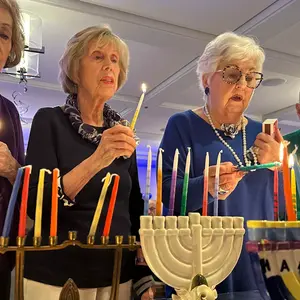
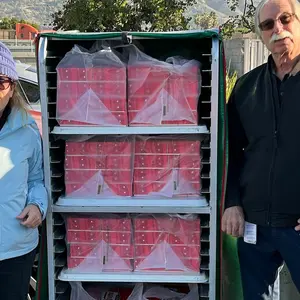

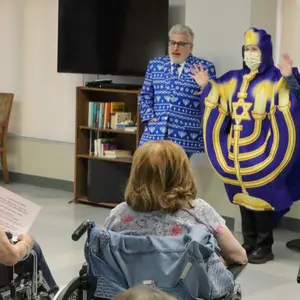
For more pictures of Chanukah 2023 at Los Angeles Jewish Health CLICK HERE